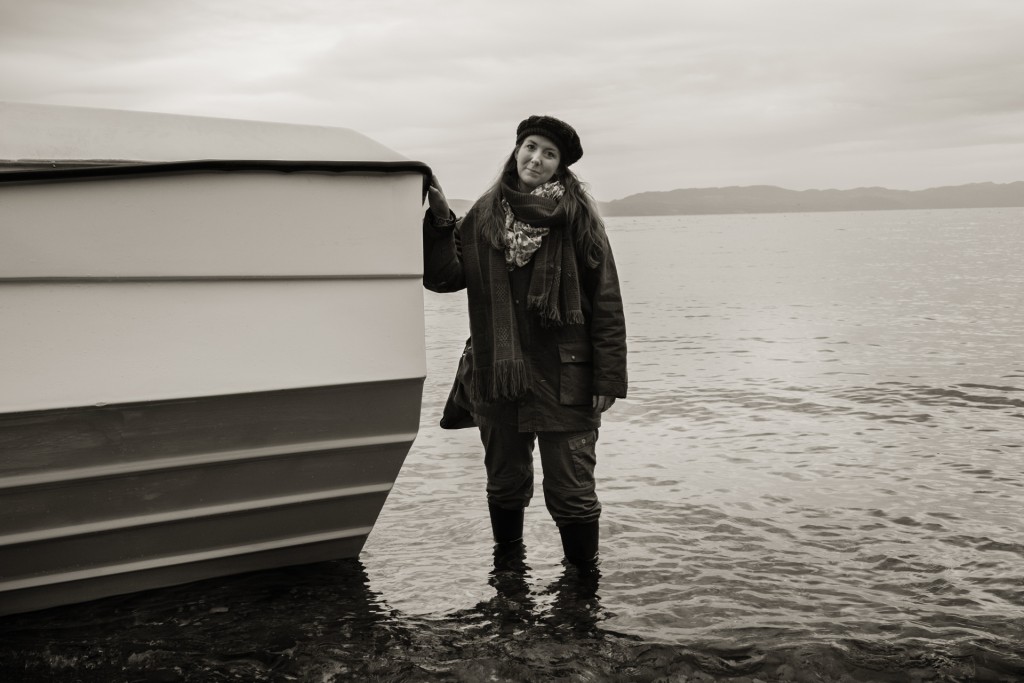I realised they were arriving with nothing; cold, wet and frightened. I was once in a similar situation and people helped me. Now I think it’s the least I can do.
Jen Shaw-Sweet :: U.K. :: Age 38 :: Advertising
What did you know about the place before arriving?
I did quite a bit of research. But the first time I came here, the day before I arrived, the rules changed. People started coming to a different part of the island, so we had to respond quickly, rescuing people from the rocks when they were shipwrecked in the south. There was no plan and no ‘system’… Luckily I had some rescue training from when I was scube-diving so I wasn’t scared… mostly we just improvised rescues and treated people for shock and cold, even hypothermia. Within days the professionals from Proactiva, from the Spanish lifeguard teams arrived. They were amazing, so capable. So then I helped a little and gave people dry socks and chocolates and tried to warm them up. It’s cold on the island in the winter.
When did you Arrive to Lesvos? The first time in November and December 2015, then back again at the end of February
How long are you here for? – I can only get 2 weeks off work at a time, so I’m coming back as often as I can
Did you come alone or with friends? – First I came alone and made friends, but this time my husband joined me for a week
What reactions did you get from family and friends before coming? – generally they were very supportive, I have excellent friends
An influential / defining moment you had on the Island or Idomen?
One night we ran out of blankets in one of the camps there was one blanket between 2 people, and no food, the next day Giada and I persuaded the Greek Anarchists to donate some surplus blankets they had to the UN camp – on the way down to deliver the blankets the lorry driver told me he hadn’t slept for 36 hours and he’d not had a day off for 4 weeks. He was exhausted. I realised I hadn’t slept for 3 days… there had been so many boats and so many people needing help. The lorry driver pulled over and he took me into the Orthodox church in his village. He showed me what to do. We prayed together for the refugees. I realised, it wasn’t his job to drive the lorry any more, it hadn’t been for days. This Greek guy, like all the other Greeks I’d met, he was sacrificing so much because he just really cared. I suddenly saw him for what he was – exhausted, but with a heart the size of Greece. And I felt incredibly humble. The Island people were just so caring for the Refugees, for the risks they were taking and worried by the dangers they were escaping, they were being the best of what humans can be. Incredibly kind
What did you learn new about life and people :
I learned about compassion… and that I had a lot to learn
Have you experienced moments of crisis or trauma
On each trip I’ve had a moment of extreme, terrible sadness… I wish I could help more. I wish I could show the people in government or in organisations that make the rules about refugees what interesting, kind, smart but also vulnerable people their actions are impacting upon.
Do you remember anyone in particular among refugees or volunteers…?
I remember many refugees, perhaps most the families. The tired mothers and fathers who, having gotten their children to sleep, often then talk about the worry and strain of their journey and their fears for the future. They try to stay so brave for their kids’ sake. I have made many friends among the volunteers and refugees – Giada and Brian, Daniel, Phoebe, Rachael, Jemila, Nunu, Johnny, Steve, Henry, Aliya, Nada, Nessim, Mariana, Marcy, Mohammed, Ibrahim, Jasmine, Liz…Claire, Rory, Gus, Siyana, Samar, Omar, James the list goes on… I love them all.
What are you taking with you back home? – I’d like to say hope… but in reality I also take home a sadness that the treatment of the refugees after they land in Europe is a poor reflection of all the hope they have for a peaceful and safe life. I’m also grateful, for the sheer luck of birth, my passport and for all the people that I’ve met in Lesvos


Would you like to share your thoughts?
Your email address will not be published. Required fields are marked *